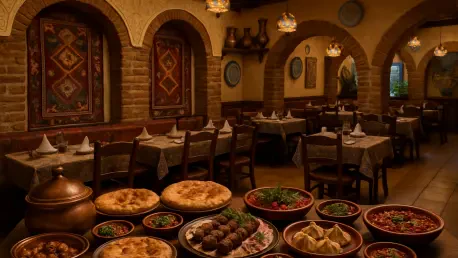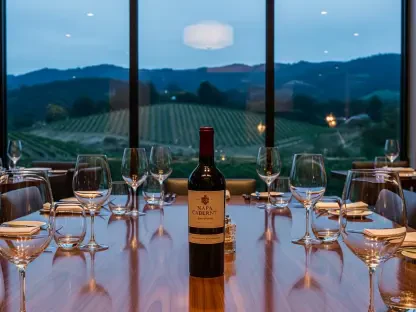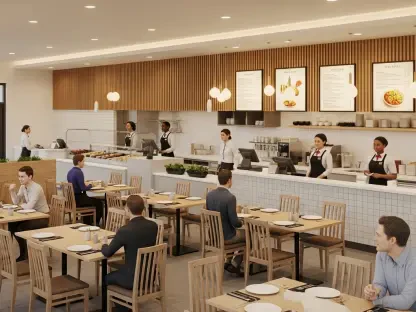In the heart of Mountain View, California, a culinary gem has emerged along El Camino Real, introducing the Peninsula to the rich and vibrant flavors of the Caucasus region for the first time, marking a significant cultural milestone. NAR Restaurant, which opened its doors on November 8, stands as a pioneering Azerbaijani eatery, bringing together the diverse tastes of Azerbaijan, Armenia, Georgia, and southern Russia. Founded by three Azerbaijani immigrants—Hikmat Babayev, Elshan Musayev, and Abulfaz Manafov—this establishment is more than just a dining venue; it’s a cultural bridge connecting the Bay Area to a lesser-known but deeply storied part of the world. With a name meaning “pomegranate,” symbolizing fertility, good fortune, and unity, NAR embodies values cherished across Caucasus cultures. Beyond its authentic dine-in offerings, the restaurant innovates with three ghost kitchen concepts for takeout, catering to the region’s fast-paced lifestyle while preserving the essence of traditional cuisine.
This unique blend of heritage and modernity makes NAR a standout in the local food scene. The restaurant not only serves meticulously prepared dishes that reflect centuries-old recipes but also adapts to contemporary dining habits with convenient options for a broader audience. A hand-painted mural of a pomegranate tree anchors the space, visually tying the decor to the cultural significance of the name, while seating for 110—85 indoors and 25 outdoors—creates an inviting atmosphere. The personal journey of the founders, who arrived in the U.S. just three years ago, adds a layer of inspiration to the venture, showcasing the power of perseverance and community-building through food. Their story, paired with a menu that spans regional specialties, positions NAR as a destination for both culinary exploration and cultural connection in Mountain View.
Unveiling Caucasus Cuisine
A Taste of Tradition
At NAR Restaurant, diners are invited to embark on a flavorful journey through the Caucasus, a region where culinary traditions are as diverse as the over 60 nationalities that inhabit it. Signature dishes like piti, a slow-cooked lamb stew simmered for hours to achieve tender perfection, capture the hearty essence of Azerbaijani cuisine. Equally compelling is shah plov, a regal dish of rice layered with lamb and dried fruits, baked within a crispy crust for a delightful textural contrast. Georgian influences shine through with khinkali, dumplings filled with spiced meat and broth, demanding a specific eating technique to savor every drop. These offerings, alongside khachapuri—a cheese-filled bread that’s a staple in Georgia—educate patrons about the breadth of flavors from the region. Each plate tells a story of cultural interplay, reflecting historical trade routes and shared ingredients that define Caucasus gastronomy in a way that’s both authentic and enlightening.
The menu’s diversity extends beyond main courses to include beverages and desserts that enhance the cultural immersion. Imported pomegranate wine, with its tart and fruity profile, pairs beautifully with the rich, savory dishes, while kampot, a chilled fruit drink, offers a refreshing counterpoint. Desserts such as burnt Basque cheesecake provide a modern twist, bridging traditional flavors with contemporary tastes. This thoughtful curation ensures that every aspect of the dining experience at NAR resonates with the spirit of the Caucasus, inviting curiosity and appreciation. For many in the Bay Area, these dishes represent a first encounter with a cuisine that’s been underrepresented in the local dining landscape, making each visit a discovery of new tastes and traditions that have been cherished for generations in a distant part of the world.
Labor of Love
The preparation of Caucasus cuisine at NAR Restaurant is a testament to dedication, often requiring hours of meticulous work to achieve authentic flavors that honor ancestral recipes. Hikmat Babayev, one of the founders, describes this process as a true “labor of love,” emphasizing the time-intensive nature of dishes like piti, which demands slow simmering to meld spices with meat into a harmonious stew. Similarly, crafting shah plov involves layering ingredients with precision to create its signature crust, a task that cannot be rushed without sacrificing quality. This commitment to traditional methods sets NAR apart in a market where speed often overshadows substance, ensuring that every bite reflects the care and heritage behind it. The kitchen’s focus on authenticity transforms dining into an experience that values patience and craftsmanship over mere convenience.
This dedication to quality also means resisting the temptation to cut corners, a challenge in an environment where fast food dominates. Babayev has noted the cultural shock of America’s dining pace, where meals are often consumed on the go rather than savored. At NAR, the approach counters this trend by prioritizing the integrity of each dish, even if it means longer preparation times. Appetizers priced between $11 and $19, and main courses ranging from $18 to $38, reflect the effort invested in sourcing ingredients and perfecting recipes. This pricing strategy positions the restaurant as an upscale venue where diners can expect not just a meal, but a cultural narrative woven into every course. It’s a bold stance that invites patrons to slow down and appreciate the artistry of Caucasus cuisine in a setting designed to honor its roots.
Innovation in Dining
Hybrid Business Model
NAR Restaurant distinguishes itself not only through its authentic dine-in menu but also through an innovative approach to takeout with three distinct ghost kitchen concepts. These virtual kitchens—Olivia Bros, Rosso, and CalSizzle—cater to the Bay Area’s demand for quick, accessible meals without compromising the restaurant’s core identity. Olivia Bros continues the legacy of the founders’ original food truck, offering Mediterranean fare that resonates with familiar yet flavorful options. Rosso introduces New York-style pizza, appealing to a wide audience with its classic, crowd-pleasing slices. Meanwhile, CalSizzle brings American comfort food to the table with burgers, wings, and subs, ensuring there’s something for everyone. This strategic diversification allows NAR to reach beyond traditional dining, meeting varied tastes and preferences in a competitive market.
The ghost kitchens operate daily from 11:30 a.m. to 11 p.m., providing constant accessibility through takeout, online ordering, and third-party delivery platforms. This setup, rolled out with new concepts starting November 20, reflects a calculated expansion to maximize the restaurant’s reach. By housing these concepts within the same space as the dine-in venue, NAR creates a seamless operation that balances cultural authenticity with modern convenience. The hybrid model taps into broader trends in the culinary world, where versatility is key to capturing a diverse customer base. For busy professionals or families seeking quick meals, these options offer affordability and speed, while still maintaining a connection to the quality associated with NAR’s brand, ensuring the restaurant remains relevant in a fast-evolving dining landscape.
Balancing Tradition and Convenience
Operationally, NAR Restaurant strikes a delicate balance between preserving the slow, intentional pace of traditional Caucasus dining and adapting to the hurried lifestyle of the Bay Area. The dine-in experience, available Tuesday to Sunday from 5-10 p.m., focuses on creating a space where guests can linger over meals crafted with care. Yet, recognizing the needs of a wider audience, plans are in place to introduce lunch service starting November 17, from 11:30 a.m. to 2 p.m. This addition targets office workers and locals seeking quick, value-driven meals during the day, blending dishes from all three ghost kitchen concepts with select dine-in offerings. The aim is to provide quality at an accessible price point, ensuring that even time-constrained diners can experience a taste of the Caucasus without sacrificing the authenticity that defines NAR.
This dual focus extends to the restaurant’s design and service model, where cultural immersion and practicality coexist. The 110-seat venue, with its indoor and outdoor seating, invites guests to relax and engage with the heritage behind the food, while ordering kiosks for takeout streamline the process for those on the go. The founders’ ability to navigate this tension—between maintaining the integrity of labor-intensive cuisine and meeting modern demands—demonstrates a nuanced understanding of their market. By offering both an upscale dining atmosphere and convenient takeout options, NAR positions itself as a versatile player in Mountain View’s culinary scene. This adaptability ensures that the restaurant not only preserves tradition but also thrives in a context where convenience often drives consumer choices, setting a precedent for how cultural eateries can succeed.
Cultural Significance and Personal Journey
Symbolism of NAR
The name “NAR,” translating to pomegranate in Azerbaijani, carries profound cultural weight, representing fertility, good fortune, and unity across the diverse nationalities of the Caucasus region. This symbolism is woven into the very fabric of the restaurant, serving as a reminder of shared values that transcend borders and histories. The pomegranate, often associated with barakat—meaning blessings or prosperity—holds a special place in regional folklore, symbolizing wealth and community. At NAR, this motif is not just a name but a mission to foster connection through food, bringing together diners from varied backgrounds to experience the warmth of Caucasus hospitality. The choice of this name reflects a deep commitment to cultural representation, making every meal a celebration of heritage and togetherness in a new land.
Central to the restaurant’s ambiance is a hand-painted mural of a pomegranate tree, which acts as a visual embodiment of these ideals. This striking piece anchors the dining space, inviting patrons to reflect on the significance of the fruit as they enjoy their meals. Combined with thoughtful decor and a layout that accommodates 110 guests, the environment at NAR enhances the cultural narrative behind each dish. The mural serves as a conversation starter, encouraging curiosity about the traditions of Azerbaijan and its neighbors. This intentional design choice transforms the restaurant into more than a place to eat—it becomes a cultural hub where stories of the Caucasus are shared, fostering understanding and appreciation among a diverse Bay Area audience that may be encountering these traditions for the first time.
Founders’ Immigrant Story
The personal journey of NAR’s founders—Hikmat Babayev, Elshan Musayev, and Abulfaz Manafov—adds a compelling human dimension to the restaurant’s story, highlighting the resilience required to bring their vision to life. Having arrived in the U.S. just three years ago, these Azerbaijani immigrants met in the Bay Area, forging a partnership through shared dreams and culinary passions. Their early endeavors included working in various kitchen roles, gaining experience across diverse cuisines such as Korean, Chinese, and Turkish. This exposure broadened their skills, preparing them for the challenges of launching a unique eatery in a competitive market. Their story resonates as a testament to the immigrant experience, where adaptation and hard work pave the way for cultural contributions that enrich local communities.
Before NAR, the trio built a foundation through smaller ventures, starting with Buta Bites, a wholesale baklava business, and later transitioning to a food truck named Olivia Bros. This progression from modest beginnings to a 110-seat restaurant on El Camino Real reflects an entrepreneurial spirit driven by perseverance. Initially hesitant to start a food truck, Babayev embraced the opportunity, turning it into a stepping stone that eventually led to securing the current space. This trajectory underscores a narrative of risk-taking and growth, where each milestone—from a parking lot operation to a full-fledged venue—represents a triumph over uncertainty. Their journey infuses NAR with a sense of purpose, transforming it into a space where diners can taste the fruits of determination alongside the flavors of the Caucasus.
A Culinary Legacy Unfolded
Reflecting on the impact of NAR Restaurant, it’s evident that this pioneering Azerbaijani eatery has carved a unique niche in Mountain View’s food scene by introducing Caucasus cuisine with unparalleled authenticity. The dedication to labor-intensive dishes like piti and shah plov, paired with an innovative hybrid model of ghost kitchens, demonstrates a remarkable ability to honor tradition while embracing modernity. The cultural symbolism embedded in the name and decor resonates deeply, turning meals into moments of connection for a diverse clientele. Looking ahead, the planned expansion of lunch services and the rollout of new takeout concepts hint at a future where NAR could continue to grow, inviting even more diners to explore these rich flavors. As a cultural ambassador, the restaurant stands poised to inspire other immigrant entrepreneurs, proving that heritage and innovation can blend seamlessly to create lasting culinary legacies in the Bay Area.









